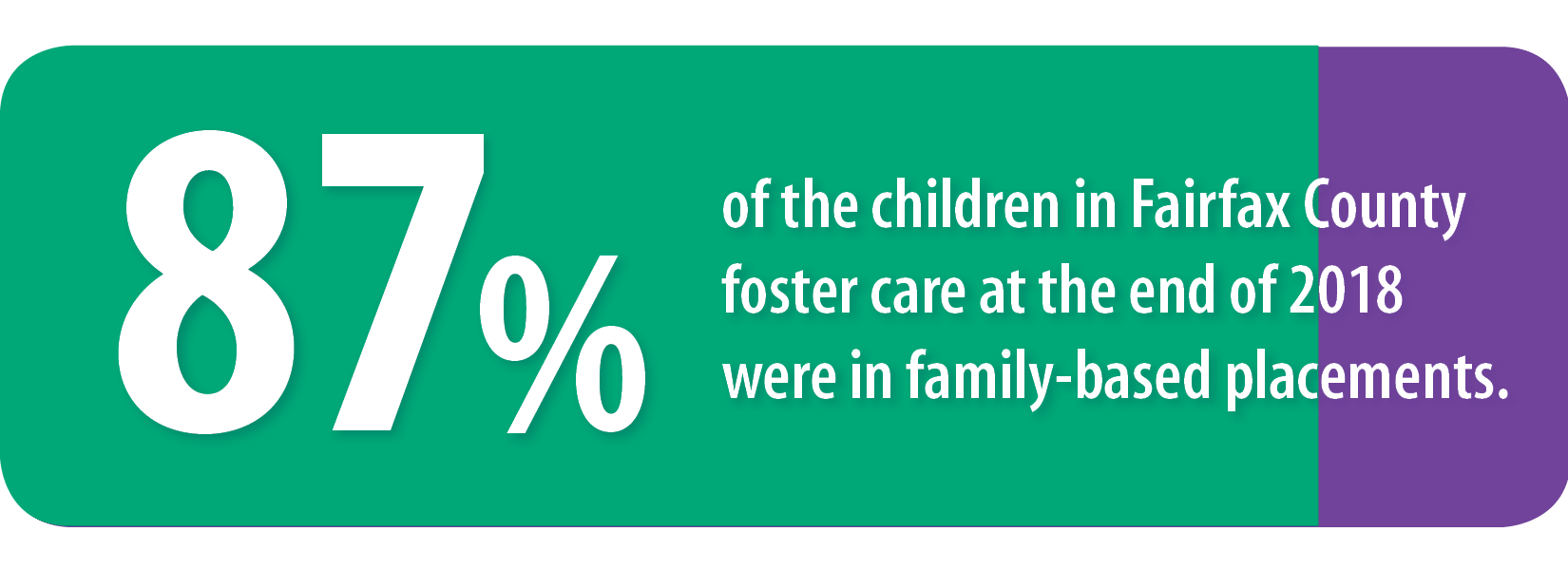
Welcome to the 2019 March issue of Foster Family News, a monthly newsletter for current and potential Fairfax County foster parents.
| Table of Contents | |
|---|---|
|
|

Improving Virginia’s Foster Care System
As you’re probably aware, last fall the Joint Legislative Audit and Review Commission (JLARC) released a report titled “Improving Virginia’s Foster Care System.” The JLARC is charged with conducting program evaluation, policy analysis and oversight of state agencies on behalf of the Virginia General Assembly.
According to the JLARC, about 5,300 Virginia children are in foster care, and total federal, state, and local spending on foster care and adoptions amounts to nearly $500 million annually. Both the number of children in foster care and expenditures for administering the system have increased in recent years.
Between 2012 and 2016, the JLARC report shows 54 percent of kids 12 and older aged or phased out of the system before finding a permanent home. That’s more than double the national average, which is 25 percent. Compared to the rest of the nation, Virginia has one of the lowest rates of foster care entries in the nation.
What else did the report find? Children’s health and safety are followed in most foster care cases, but lack of adherence to requirements in some cases puts children at risk. Expanded state-level policies and investments are needed to place more children in family-based foster care settings. Additional casework is needed to improve the likelihood that children in foster care will find a permanent home. Fifteen percent of caseworkers carry high foster care caseloads, and high caseloads affect nearly one-third of children. It also found that VDSS has not effectively supervised the foster care system and does not have an effective means to identify and resolve poor performance.
It is important to note that Fairfax County surpasses State requirements and/or expectations in the following areas:
- monthly client visits from social workers;
- children placed in family-based settings;
- children placed in institutional care;
- rate of children in foster care;
- reuniting children with parents and finding permanent homes; and
- low caseloads.
There are some areas of concern outlined in the report in which Fairfax County admits it should, and is working to, improve. These include: recruitment of more foster families and increasing the number of children leaving foster care to permanent families (instead of aging out). More information is included in a recent letter you should have received from the Department of Family Services.
To address the issues cited in its report, the JLARC has made a number of recommendations. There is currently legislation being considered in the Virginia legislature to address some of these recommendations. Let’s hope our state, county and foster families get the support they need to provide the best situation and outcomes possible for our kids!
All the best,
Bethany Shively
President
Fairfax County Foster Care and Adoption Association (FCFCAA)
 A young person without a phone is his or her hands—sounds like an oxymoron, doesn’t it? We’ve developed these guidelines to help in case a child in your care has been clamoring for a phone.
A young person without a phone is his or her hands—sounds like an oxymoron, doesn’t it? We’ve developed these guidelines to help in case a child in your care has been clamoring for a phone.
The decision for a teen or child to have cell phone access should be a collaborative decision made by the team (foster youth or child, foster and bio parents, DFS worker, TFC worker, and therapist if the child is seeing one) and should also be based on the responsibility and maturity level of the teen or child.
Talk to your child about the rights and responsibilities that come with using a phone. Let them know:
- Cell phones are a privilege, and they can be taken away.
- Cell phones come with a lot of responsibility.
- They must agree to, and sign, a “Cell Phone Agreement.”
- They must follow all the rules and expectations that are outlined in the agreement.
What should the agreement look like? It should be a collaborative effort with input from each team member and should outline rules and expectations (see examples in the bulleted list below). Once the contract is approved by the team, everyone should receive a copy.
What you can include in the rules:
- Foster parents must know all the young person’s passwords.
- Youth must turn the phone in by a certain time each night.
- Grades have to be maintained at a certain level.
- At any time, they must be willing to turn their phone over to the foster parent upon request.
Adapted from "Social Media: Tips for Foster Parents and Caregivers" (Child Welfare Information Gateway)
Each newsletter will include this section to help answer questions, spotlight the people who support foster families, highlight the donors and sponsors who generously give to foster care programs and activities and friendly reminders for foster families to sign-up for trainings.
 Question: How do I arrange for summer camp? Who is responsible for payment?
Question: How do I arrange for summer camp? Who is responsible for payment?
Answer: Children who are placed in foster homes approved by the department may attend a specialized summer camp within the following guidelines:
Approval of expenditures up to $500 may be given by the child’s specialist. The program manager will consider exceptions to this amount only if the child has a significant disability or the cost of camp is less than the child’s day care expenses. The approval must be given in advance by the child’s specialist, with sufficient time for the department’s contracts staff to work out a fiscal agreement with the camp. Payment for camp may be made only by the department directly to the camp. We are unable to reimburse foster parents if they make payment to a camp. (Note: The department still pays for regular daycare summer camp for school-aged children; this FAQ refers to specialized summer camps only.)
Reimbursement for other types of recreational fees, such as for a class or entry ticket to a major amusement attraction (e.g., Busch Gardens, Kings Dominion, etc.) must be approved in advance by the specialist. The decision to make a direct payment to the vendor by the department or to reimburse the foster parent will be made on a case-by-case basis.
Check out other frequently asked questions and answers from past issues.
At the end of 2018, 87% of the children in Fairfax County foster care were in family-based placements.

 Our partners and donors are the true power behind communities of care for Fairfax County Foster Care and Adoption. With them we can provide amazing support services, community events and after care resources.
Our partners and donors are the true power behind communities of care for Fairfax County Foster Care and Adoption. With them we can provide amazing support services, community events and after care resources.
 This issue highlights the and thanks Hillmann Consulting LLC, a leading environmental consulting, construction services and construction risk management company, which recently joined our donors ranks.
This issue highlights the and thanks Hillmann Consulting LLC, a leading environmental consulting, construction services and construction risk management company, which recently joined our donors ranks.
Contact Information
Hillmann Consulting
703-914-1135
hillmannconsulting.com
Check out highlights of other donors and sponsors from past issues.
 The following trainings and conferences are for Fairfax County foster parents only.
The following trainings and conferences are for Fairfax County foster parents only.
Inservice (For certified Fairfax County foster parents. Registration required.)
Learn more and save the dates for upcoming trainings and conferences.
 What do you want to see in Foster Family News?
What do you want to see in Foster Family News?
Submit your suggestions to Kendra Lee.
Check out past issues of Foster Family News.

